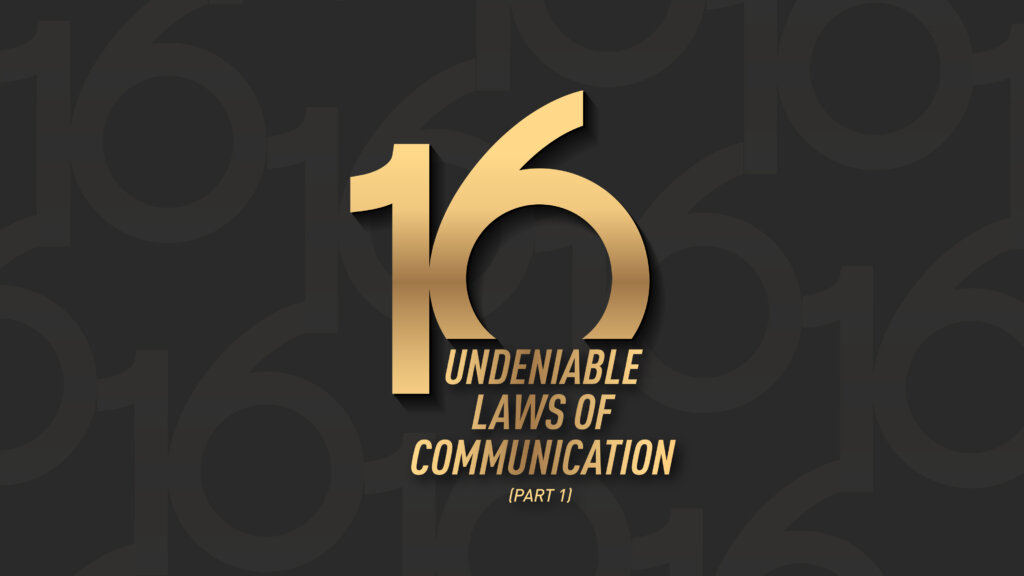Executive Podcast #230: 16 Undeniable Laws of Communication (Part 1)

John has a new book ready to hit the shelf on March 28, 2023 that every one of us needs to put to work in our business and professional lives. Everyone can learn and grow in the area of communication.
The book is, The 16 Undeniable Laws of Communication – Apply them and make the most of your message.
Today we are looking at Law #1 – The Law of Credibility, which says, “Your most effective message is the one you live.”
Get FREE advance access to Chapter 1 here!
Perry Holley:
Welcome to the Maxwell Leadership Executive Podcast for our goal to help you increase your reputation as a leader, increase your ability to influence others, and increase your ability to fully engage your team to deliver remarkable results. Hi, I’m Perry Holley, a Maxwell Leadership facilitator and coach.
Chris Goede:
And I’m Chris Goede, executive vice president with Maxwell Leadership. Welcome, and thank you for joining. And we really do mean that, Perry and I are just so grateful, Jake, our team, when we see the comments and the impact from those that are listening around the world, not only growing individually, but then what we’re hearing, how they’re sharing it with their team and they’re growing. So really, really, we do thank you for being a part of this podcast and family with us.
Perry Holley:
[inaudible 00:00:49] people they found us on YouTube, which they said, “I didn’t know you were on YouTube.” I said, “Well, I didn’t either, but these cameras are [inaudible 00:00:55].”
Chris Goede:
That’s right.
Perry Holley:
I’m not sure what they had the cameras for.
Chris Goede:
The question is if they come back to YouTube, and watch us again, because after they see us on YouTube, they might not come back [inaudible 00:01:02].
Perry Holley:
[inaudible 00:01:02] told us we had a face for radio. I don’t know what that meant.
Chris Goede:
That’s right. Well, as we get started, we always talk about where can you go and download the Learner Guide. And as usual, Perry has put together an incredible lesson for us today, and it has a learner guide for you just to follow along with and take some notes and just make some thoughts about what are your action steps going forward. And if you want to download that, we want to encourage you to go to maxwellleadership.com/podcast. And then in addition, if you want to leave a comment or a question and what period [inaudible 00:01:33]
Perry Holley:
Or an idea.
Chris Goede:
Perry really loves where I was going, an idea for a future content lesson. We’re 228 episodes in with this episode. And so…
Perry Holley:
I’m amazing, aren’t I?
Chris Goede:
You are amazing. And so, he’s raising his hand now saying, “I definitely need some help.” Well, we’re excited to talk about not only this session, but the next one as well, a new book that’s being released by John. And we’re going to kind of build off of this and Perry’s holding it up for those that are on YouTube watching it with us. A new book is, and it’s got a number in it. It’s got the word law, if it’s John’s book, The 16 Undeniable Laws of Communication, this is going to be the first part of that. The book comes out… It doesn’t come out till March 28th. And so we were able to get the manuscript ahead of time. You dove into that.
To be a Successful Leader, You Need Feedback on Your Leadership.
We’re excited to announce our new and improved Organizational Effectiveness Survey (OES). The OES gathers feedback from employees to give leaders and management the knowledge and action plans needed to develop a more effective and productive work environment. Our new version measures 4 areas of your business: Leadership, People, Strategy, and Performance.
Perry Holley:
We know people.
Chris Goede:
We know people, and we’re going to just pull some content out of that. We want you guys to be the first to hear it and be able to apply it. And really the premise of the book, and John really believes that everybody can grow in this area of communication, which is good, that’s good for me personally, that we can do that.
Perry Holley:
All of us. Yes.
Chris Goede:
But he wants all of us to be able to say, “Hey, if you put in a little bit of work both in your personal and your professional lives, this is going to help you communicate.” The subtitle of the book is Apply Them and Make the Most of Your Message. So we’re going to dive in, it’s a two-part series. Talk to us a little bit, Perry, about this first one and where you wanted to go. What grabbed you right away that you wanted to share with our listeners?
Perry Holley:
Well, what grabbed me right away is it’s about communication. And as you said, we all think we’re pretty good communicators, but it is like listening. I think those two areas we could really, everyone can improve. It’s just an intentionality about I need to grow and we’ll probably talk about it, but you and I have mentioned many times about intention, perception gap. What I intended one way they perceived another. And I just personally believe that is a part of every single conversation, either to a one-on-one or to a group that we have. And we want to look at how did I minimize it if I know it’s going to exist, but can I shrink it so that what I intended you perceived and our communications are more in line.
Perry Holley:
And I thought what John has put together here really is a nice collection. We also saw him, if you were at Live to Lead last year, he did some teaching and some other places. I’ve seen him just do one-offs of a law here and a law there. So I’ve been really expecting this one and looking forward to it. I did place in the learner guide, the table of contents, so you can see all 16 laws and what they are about. But I’ll just tell you, the book is broken up into five sections and the sections about the who, what, why, where, how of communicating about who said it.
Perry Holley:
There were three laws underneath that and we’ll take one of those today. What is said three laws. How it was said, is six laws. When it’s said, two laws. And why it was said are two laws. So John wrote the book and he says this right up front, is helping anyone that has to communicate one on one or with a group. I like this. If you are a leader, you probably get a chance to publicly speak in front of audiences. This has got a lot of tips and ideas about how to do that. And since I do a lot of that, I was anxious to see that, if you have ever seen John, he’s pretty darn good at it. And so, he knows and he’s learned a lot over the years of doing that. So I find it’s got a lot for everybody.
Chris Goede:
It’s great content and it’s a book that you’re going to want to pick up. And what I love is take notes and then apply it and then come back and say, “Is this making an impact on my leadership and my communication?” You and I talk a lot about Harvard Business Review, and it’s something that we dive into and read quite a bit. They wrote, “The number one criteria for advancement or promotion for those in organizations, is the ability to communicate effectively.” And it’s also something that you and I hear about, our team hears about when organizations reach out and say, “Hey, we need some help. We want to partner with you guys.”
Chris Goede:
Without a shadow of a doubt, in the top three all the time is communication, both internally and externally inside organizations. And so, we want to make sure that we help you guys work through maybe some poor communication habits that you have. I love what you talked about in the intent versus perception gap, because there are a lot of us that we think we’re communicating clearly. We in our head have it just mapped out perfectly, but there’s no doubt it gets misinterpreted, it’s misunderstood. And we say that as a leader, it’s your responsibility to close that gap. As a communicator, it’s your responsibility to close that intent versus perception gap. So I love where we’re going [inaudible 00:06:21] talk about it.
Perry Holley:
Yeah, as you were saying that, I’m thinking, “Well we’ve made it sound a lot like a business class.” This is a life class, a life book, because most of my failed communications don’t happen at work.
Chris Goede:
Where do they happen Perry?
Perry Holley:
Well, at home. There’s a lot to learn about how to communicate at home as well. I do like the fact that John points out that all this can be learned and not a lot of us get this naturally, you get to learn it. Each law does stand alone. They relate to each other. But you could jump around the book and pick out a law here and there to work on. All the laws, like most laws have consequences. You don’t do them, you’re going to get a result. You do do them, you’ll get a different result.
Perry Holley:
I love that he said they’re timeless. They’re not for any particular time. A law needs to be applied across time and they are the foundation of all things good around communication. Where I wanted to start in the time remaining today was looking at law number one, which I think is law number one for a reason. I’d love your opinion on that. But it’s called the law of credibility and we’ll get the into more of that. But when it comes to being law number one, under the topic of who said it, that almost all your communication is going to be perceived, because it’s how it’s coming from you and who are you. How do you see credibility when it comes to communicating?
Chris Goede:
Well, it’s interesting, no matter how good of a communicator someone is, with my lens if I don’t feel like they’re credible, then I will discount whatever they’re communicating. And so, I love that he talked about this as law number one. Back when he wrote the 21 Irrefutable Laws, that’s right where my mind went when you said, “I want to get your opinion on why you thought this was first.” The first law he wrote, there was the law of the lid. And in essence, this is the same thing. If we’re not living out, we’re not a credible individual, leader, whatever it might be, dad, brother, whatever it might be, then the communication is just going to hit straight on the ground. And so, it is no doubt, your most effective message is the one that you can live out and you got to be credible to be able to do that.
Chris Goede:
You always talk about this statement that people are always watching you as an influencer, as a leader. And so, knowing that they’re always watching you, you need to be aware of that and you need to make sure that you have that credibility. You put a great little quote in here from our friend Jamie Kern Lima, and she says, “Your authenticity doesn’t guarantee your success, but lack of authenticity guarantees failure.” And I thought, man, that is so true. And it goes right back to that quote that we talk about where authenticity is a trust accelerator. And so, just the credibility, the trust, the being authentic is the foundation for you to become an effective communicator.
Personal Growth Day:
Hey, podcast listeners, how would you like to be equipped with the tools to continue your personalgrowth and refine your strengths and weaknesses, all while being surrounded by other growth-mindedleaders like yourself? You may have heard of Personal Growth Day. For our second time ever, MaxwellLeadership is hosting this one day event on March 13th in Orlando, Florida. This event is designed to digdeeper into who you are and how you tick so that you can become the best version of yourself. If you’reunable to attend Personal Growth Day in person, we also offer virtual access to the event. If you wouldlike to participate in a one-of-a-kind experience and stand shoulder to shoulder with growing leaders whowill sharpen your skills and equip you to create powerful positive impact, go tomaxwellleadership.com/personalgrowthday to learn more or get your ticket. We’ll see you there.
Perry Holley:
And so, the law of credibility says your most effective message is the one that you live. And as Chris says, people are watching you and your audio and video need to line up and do that. So in the chapter, John talks about five qualities of the credible communicator. Do you know where he got the doing five?
Chris Goede:
You? From Perry Holley?
Perry Holley:
You heard it here first. Fantastic.
Chris Goede:
That is awesome.
Perry Holley:
All right, let’s go through these and see what we can learn here. Number one was, if you want to be a credible communicator, you need to be transparent. And communication is more than just sharing information. It’s sharing yourself, your real self. And I often think about, I’ll get your opinion on this, but we talk about vulnerability, about me being who I am, but does letting people see the real you sound like a risky thing for leaders to do, is kind of the question that it answers there.
Chris Goede:
I think we lost most leaders when you said the word vulnerable. That’s probably the big hangup. And we’re not saying just to air all of your dirty laundry. We’re just talking about just be real. Just be vulnerable with who you are. And we’ve used examples on this podcast and in some of the lessons I’ve heard you teach in front of teams before. They already know where you struggle. They know you’re leading strong. And so, be vulnerable with them and you can build trust with each other.
Perry Holley:
[inaudible 00:12:06] John said, “They already know you are vulnerable. They already know you have weaknesses. They just want to know if you know.”
Chris Goede:
That’s right. And so, make sure we’re not inauthentic when it comes to that. And your credibility will continue to increase as a communicator. So don’t be afraid of the word vulnerable. Really think about, man, I just want to be real. I want to be transparent with my team and be authentic coming back to that and you’ll increase the trust.
Perry Holley:
What do you notice in a communicator, a leader, a manager, a teammate, that tells you they’re not being transparent? Is it putting on [inaudible 00:12:38] or is it trying to make you think I’m something I’m not? How does it show up the most?
Chris Goede:
For me, I feel like it, there’s two extremes. They’re putting on a little bit too much. You can feel that it’s a little over the top. The other, is you can feel it when they’re extremely guarded and not necessarily sharing exactly kind of where they’re at on their journey or what they’re thinking about. So the second one in this chapter, the qualities that John talks about here, is be consistent. This is something that you and I could do an entire day on in regards to leaders and communicators being consistent. So what we repeatedly do tells others who you are. And so, talk a little bit about this word consistency, because I know you’re passionate about it in regards to leadership and then how this plays in to that quality of a credible communicator.
Perry Holley:
I think it’s one of the essential words of leadership, is consistency. If you’re not consistent in your emotions and in your behaviors, I can’t predict how you’re going to show I tell you something hard, I give you bad news or I don’t know how you’re going to handle that. You’re inconsistent in your ups and downs or highs and lows. It doesn’t breed psychological safety. People will not feel safe, so they will be guarded. They will hold back. I just assume not tell you. You’re going to find out sooner or later. I’ll just wait till later to deal with that. So I love consistency to say, can I let people know what they can expect from me and that I’m consistent in the high times. I’m not too high in the low times, I’m not too low, but I always handle things in a consistent manner.
Perry Holley:
And that opens up safety, leads into that inclusive behaviors that make people want to be with you [inaudible 00:14:24] I belong here. It’s okay. You can trust Perry. He’s not going to blow up to do that. Number three, was can you be a good example? If you’re going to try to build communication credibility, I’ve got to be a good example. So what they see is seeing is believing. John says he doesn’t teach or speak to things he doesn’t know or hasn’t experienced. I’ve heard him give this lesson before about when he was preaching that he had to preach some things in the Bible. He hadn’t really experienced, he didn’t have the credibility. He couldn’t be the example. What’s your idea about this when it comes to leaders and being the example?
Chris Goede:
I think for me as a communicator, when it talks about being a good example. In order for you to put yourself in the communication, to put yourself in the story, in the analogies, you have to be living out that example. And I think when you do that and you are that good example, this is not a, you don’t want to do it in a narcissistic way where we’re talking about Perry, we’re talking about Chris when we’re communicating. But to be able to use examples in a healthy way, I think you need to be living that out and be a good example for your team.
Chris Goede:
So that you can pull stories from that and be able to communicate what those are. This reminds me of a great quote from Kouzes and Posner, two great leadership authors. John thinks a lot of them as well, and they say, “The truth is that you either lead by example or you don’t lead at all. Seeing is believing and your constituents have to see you living out the standards you set and the values that you profess.” And I love that. It’s like who you are and what they see, that’s the example that you need to be living out.
Perry Holley:
And you think about that, is you said you have a standard of operation for your team. They know what you expect or they should, and then you don’t live to that standard. You tell them, like me telling my kids to clean the room, but my room’s not clean. Make your bed, but I didn’t make my bed. I have no credibility if you’re not seeing me do it. I love that too.
Chris Goede:
Before I go to number four, I just want to quickly stop for just a second. One of the things that Perry went through the manuscript and pulled out some of this content for you, but we’re also going to give you access to this full chapter of the book, even before it comes out on March 28th. So hang with us, at the end Perry’s going to tell you a little bit about how to access that chapter of this book, and then you can really dive in, because we’re just talking about a couple of the qualities in this first chapter. Well, number four, we want to talk about, be competent. The weight of communicator’s words is determined by what they have accomplished.
Perry Holley:
If you think, if you’re not competent, and we always talk about what is it, EQ or IQ? Which matters the most in leadership and there’s lots of research on that, but definitely EQ is the heavier, some say 80, 85% of leading is EQ, your emotional intelligence. But the ticket to admission is your IQ. If you’re not competent, you’re not going to have influence with me. And so, same thing with your communication. If you don’t know what you’re talking about, it’s going to be tough to have credibility. I was thinking about our sons, we talk about them frequently, but my son owns a Chick-fil-A, and I can talk all day to him about how to run a restaurant, but I have no competency in that.
Perry Holley:
I have no credibility in that. He’d listened to me in some areas, but maybe I shouldn’t be telling him how to run a restaurant. Your son at this time playing college football, which you played. You have a lot of competency in that space. And when you talk to him about that, you have a lot of credibility, because you’ve been there, you’ve done that. And I thought for me it was really about the weight of your credibility as it’s related to your [inaudible 00:18:15], I’m not going to tell anybody how to run a restaurant, but neither should you.
Chris Goede:
Neither should I. Now, I can tell you how to eat at a restaurant. It’s interesting though that you say that, and I hadn’t thought about this, but yes, I have that experience and so I’m able to speak into some things. But what’s fascinating, maybe a little bit hurtful at times is that the further I get away from the game, I now see him going, “Okay, that might have worked back in the day. Thanks dad, for the input.” So just continuing to grow and to stay in pace as leaders, whatever you’re communicating on will help you when it comes to that.
Perry Holley:
I love that though, because of that separation, that distance and he’s learning and you’re not in that space anymore. You were there, but it changes your communication. What a great [inaudible 00:19:03] lesson, is that you now probably would ask more questions, “Hey, in my day it was this. What are you finding?” So that as a leader, that’s a great communication tip right there, is not to think because you did it once you know everything. You actually are open, like you said, learning and growing yourself. But that young man’s in it. So, hey, tell me about this. Now you learn something new from him. So communication is happening.
Chris Goede:
And I think that came to me as a lesson, because I’d say, “Hey, back in my day, this is what…” And he just giggled and didn’t say anything out of respect. I was like, I might be past my time. I might need to be closing that gap.
Perry Holley:
Is that gray I see you on the side of your head there?
Chris Goede:
That’s right.
Perry Holley:
All right. And then the final number five, was to be trustworthy. I’m not sure why this one was number one, trust is your greatest asset, both as a leader and as a communicator. I think we talk a lot about this, but trust is…
Chris Goede:
Yeah, I think this is key. This is the foundation when it comes to five levels of leadership. We talk about this at level two, for people to be able to connect with you and all starts with trust. And so, just a couple of thoughts here with no trust. They may feel like you’re trying to manipulate them, and we talk a lot about the fine line between manipulation and influence is the motive. And so, if they don’t have the trust, they’re going to really be concerned or worry about what your motive is. And if you do have trust with them, they’re taking it as motivation and they know that you’re just trying to motivate them. With trust it feels like you are for me, Jeff Anderson and the message of, for me, I love that, “With no trust, it feels like the leaders are for themselves.” And that can be a definite way for people to just shut down the communication.
Perry Holley:
Final thought. John did add something I thought was interesting. I think it came from his friend Dan Ryland, and maybe Dan had done this, but take the communication into the five levels of leadership since it’s so much a part of what we talked about. I threw it in here. But he said, “At level one, people have to listen to you. You’re the boss.” And so is that a good thing? Well, it will be for a bit, but he said, “Level two people want to listen, because they like you.” I love that. Level three says, “People like to listen because you’re good at what you do.” So think about level one, is you got a position. Level two, you got relationship. Level three, you’re producing results.
Chris Goede:
Well, and then level four, and I love that you’re bringing this in. This is so much of the foundation what we do, people seek to listen because you’re adding value to them. You’re developing that [inaudible 00:21:33].
Perry Holley:
That’s people development.
Chris Goede:
That’s people development. Level five, the pinnacle level where people are eager to listen just because of who you are and the impact that you’ve had in their life and on their journey. And that’s that level five.
Perry Holley:
I highlighted those words to say that, and I’ll put this in the learner guide they have to, they want to, they like to, they seek to, they’re eager to. What a great way [inaudible 00:21:54].
Chris Goede:
That’s good. Well, as we wrap up, here’s what I was thinking about as we were going through this lesson today, and then I’ll kind of let you close. My thought is this, I was with one of our executive facilitators and coaches last week, and he had this phrase that just really captured me. And as we think about the qualities of a communicator, I think it’s very relevant to what we’re talking about today.
Chris Goede:
And he said, “Your team, your people, those that you have influence with, how they experience you is how they will then have certain expectations of you are on you. And because of that, that becomes your reputation. And because of that, that then becomes your leadership and communication brand.” And so, if we think about this and setting the foundation of what do we want our communication brand to be, John gave us five great qualities here that you unpacked for us in this lesson. And I would just encourage you to go back and review each one of those and think about what does your communication look like around those qualities of being a credible communicator.
Perry Holley:
And just a reminder, if you want to learn more about our offerings, or want to leave a question or a comment for us, you can do all that at maxwellleadership.com/podcast. In the show notes, there will be a link that you can click on to learn more about downloading chapter one that we just we’re talking about here from John’s new book. You can also, in the learner guide, there will be a QR code that you can snap and it will give you a lot more information about the book. We would love you to go to the site, we’d love you get that first chapter, and we’d love hearing from you. So leave us a comment or a question and we’re so grateful that you would spend this time with us each week. That’s all today from the Maxwell Leadership Executive Podcast.













Be the first to comment on "Executive Podcast #230: 16 Undeniable Laws of Communication (Part 1)"